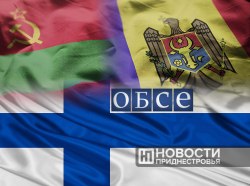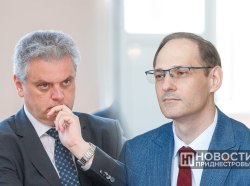When there is a storm in any sphere of social life, someone is always «splashed out» from a common boat: someone may break down, the boat seems to be sinking and it is better to swim individually instead of going down with the rest.
The fact that Pidnestrovie's economy has long and severely been «stormy» (perhaps not as much as the neighbours' economies but rather seriously anyway) is evident to any impartial observer. There are very many risk factors ranging from Ukraine's embargo on the importation of excisable goods, which is unprofitable to both Pridnestrovie's budget and a number of renowned companies in the country to Kishinev's constant pressure on some Pridnestroivan companies and their management.
On the whole, it is rather nervous in Pridnestrovie today. If speaking about particularities, the chief factor making some Pridnestrovian businessmen nervous is the upcoming refusal of the EU to grant Pridnestrovie export preferences since 1 January 2016 as a method of involving the country in the DACFTA — a free trade zone between the EU and Moldova.
There is a feeling of upcoming rush job and even possible loss of some profitable business projects, which is compelling even today some political circles of the non-recognised republic to come out of «patriotic shadow» and show their true faces. The withdrawal of EU preferences is more than just dangerous for Pridnestrovie.
However, the country's leadership has never agreed to make any concessions on the accession to the DACFTA. As is known, when Moldova was negotiating its association with the EU, Pridnestrovie was insisted on refusing the idea of the Eurasian integration and enter the EU-Moldova zone on common terms. The withdrawal of preferences, which was due to come in force on 1 January 2015, was also used as leverage back then.
However, the incompliance of the Pridnestrovian leadership made Europeans to start direct talks with Pridnestrovie. This is the second year that European emissaries Luc Devigne and Pirkka Tapiola make regular voyages to Tiraspol, trying to seduce Pridnestrovie's government and the Ministry of Foreign Affairs. The process of seduction does not seem to be very successful, otherwise Moldovan and European newspapers are full of enthusiastic headlines like «Pridnestrovie chooses Europe!», «Farewell to Russian dream», etc. The emissaries themselves do not talk much about the results of their admonitions. At the same time, there have been interesting statements in the media over the past six months: some representatives of Pridnestrovie say they are ready to accept EU terms and, in fact, to join the DACFTA. The Romanian ambassador to Moldova, Marius Lazurca, said about it quite recently: Pridnestrovie's business community is ready for anything.
The underlying reason for such leaks had been hidden until 11 September 2015 when Supreme Council deputy Alexander Korshunov, who is known for his self-sacrificing struggle in social networks, submitted a draft law «On value added tax on the goods imported from the EU.»
The essence of Korshunov's initiative adds up to a simple formula: to lift customs duties on the goods imported from the EU since 1 January 2016 and replace them for value added tax — this is the provision stipulated in the DACFTA agreement signed by Moldova and the EU.
Meanwhile, Pridnestrovie's official position has always been based on the firm refusal to fulfil any (!) DACFTA provisions going counter to the economic and political interests of the country because Pridnestrovie has not signed anything. Simply speaking, behind the government's back, which is steadily trying to protect national interests and preventing Pridnestrovie from being dragged into the EU legal and economic framework, the parliament is ready to accept all terms of the EU (and in fact Moldova's). One could disagree — this is the initiative of just one MP which is unlikely to be approved by the parliament — but the situation is much more difficult. Alexander Korshunov has been in politics for years. Rising through the ranks from a city council deputy in Bendery to a Supreme Coucil deputy, this «people's representative» skilfully exploits an image of people's servant and democracy fighter. A. Korshunov owes his political career, as do many of his colleagues, to the Renewal political party, sponsored by this very renowned company, Pridnestrovie's biggest holding company, whose enterprises, it should be recalled, were the first to get registered in Moldova in 2006.
Generally speaking, all electoral campaigns of Renewal MPs were sponsored by the company in return for their full loyalty and lobbying the company's interests. In addition, Korshunov owned a chain of retail stores and purchased goods, along with many others, at the wholesale depots belonging to this very monopolist. So, it is evident that the initiative of forcing the DACFTA through in Pridnestrovie does not belong to him, but his puppeteers — Korshunov is not an independent figure. Moreover, he openly tells his electors that he has sold the chain of stores and for that reason he is totally dependent on the holding both politically and financially (money for the electoral campaign do not come out of nothing).
It is peculiar that the Supreme Council has never hidden that the text of Korshunov's embarrassing draft law has been mostly compiled by the advisor to the chairman of the parliament, Mr Martynov, who is doing his best now to become an MP. It is clear that Korshunov and Martynov, who has read a couple of books on economy and for this reason has authority with the deputies sponsored by the holding, provide cover for more outstanding figures. For example, for the speaker of the parliament, Mikhail Burla, who is chairman of the central committee of this very pro-monopolist Renewal party and who came across his Moldovan counterpart, Mr Candu, in Bendery on 18 May 2015 and had a talk to him.
What two ethnic Romanians talked about in Pridnestrovie's city of military glory is not certain since the statements made by their press offices differ. The press service of the Moldovan parliament announced that issues concerning «foreign trade operations from 1 January 2016» (thus giving away Mr Burla) had been brought up at the meeting. No wonder that the press office of the Supreme Council did not comment on the meeting.
Korshunov's bill, therefore, has splashed out the interests of some commercial companies, including this very «pragmatic monopolist», and again these interests do not coincide with the interests of the Pridnestrovian people. So it is not Pridnestrovie's government, which was blamed by some media outlets, that is a weak link acquiescing in requirements of Moldova and the EU. The government is, to the best of its professional abilities, stubbornly protecting the interests of Pridnestrovie, national budget and enterprises. It is people's servants from the Renewal party who have decided to fit in the trade regime imposed on Pridnestrovie by Moldova and its EU sdupervisors.
The monopolist seems to have outgrown Pridnestrovie and does not care for people's interests, who have voted for the Russian vector of development. For them it is more important and advantageous to trade with the EU on any terms and under total supervision of Moldova. The situation is very similar to that in 20006, when some big firms nearly forced the ex-president, Smirnov, to put up with export restrictions imposed by Moldova and Ukraine, which not only laid to rest Russia's attempts to restore the status quo but also made prerequisites for imposing similar restrictions on Pridnestrovie's import in 2015. While Pridnestrovie's authorities are trying to protect the country's interests and re-orientate its export to CIS markets, big business adherents are doing their best to push the country into the free trade zone with the EU, abiding by the precepts by Moldova's ex-premier, Leanca, and the Romanian ambassador, Lazurca, who publicly mentioned some «signals» on the part of Pridnestrovie's MPs and business community (now it has all clicked into place). It looks like there is a task to create a situation in Pridnestrovie when business will «exert pressure on the authorities from below», insisting on joining the DACFTA, which is seen by Moldovan politicians as the first and principal step on the path to Moldova's «reintegration».
So, we can only congratulate our Romanian «colleagues»: they have succeeded so far in creating a fifth column.
A. Vasilenko, media expert








